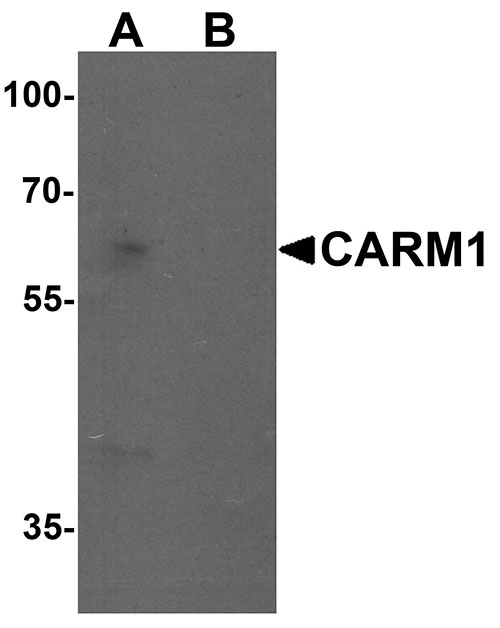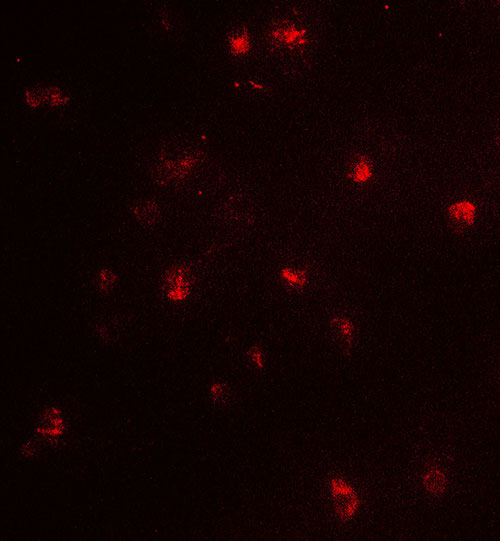CARM1 Antibody
- SPECIFICATION
- CITATIONS
- PROTOCOLS
- BACKGROUND

Application
| WB, IF, E |
|---|---|
| Primary Accession | Q86X55 |
| Other Accession | NP_954592, 40288288 |
| Reactivity | Human, Mouse, Rat |
| Host | Rabbit |
| Clonality | Polyclonal |
| Isotype | IgG |
| Calculated MW | Predicted: 67 kDa |
| Application Notes | CARM1 antibody can be used for detection of CARM1 by Western blot at 1 - 2 µg/mL. |
| Gene ID | 10498 |
|---|---|
| Target/Specificity | CARM1; |
| Reconstitution & Storage | CARM1 antibody can be stored at 4℃ for three months and -20℃, stable for up to one year. |
| Precautions | CARM1 Antibody is for research use only and not for use in diagnostic or therapeutic procedures. |
| Name | CARM1 |
|---|---|
| Synonyms | PRMT4 |
| Function | Methylates (mono- and asymmetric dimethylation) the guanidino nitrogens of arginyl residues in several proteins involved in DNA packaging, transcription regulation, pre-mRNA splicing, and mRNA stability (PubMed:12237300, PubMed:16497732, PubMed:19405910). Recruited to promoters upon gene activation together with histone acetyltransferases from EP300/P300 and p160 families, methylates histone H3 at 'Arg-17' (H3R17me), forming mainly asymmetric dimethylarginine (H3R17me2a), leading to activates transcription via chromatin remodeling (PubMed:12237300, PubMed:16497732, PubMed:19405910). During nuclear hormone receptor activation and TCF7L2/TCF4 activation, acts synergically with EP300/P300 and either one of the p160 histone acetyltransferases NCOA1/SRC1, NCOA2/GRIP1 and NCOA3/ACTR or CTNNB1/beta-catenin to activate transcription (By similarity). During myogenic transcriptional activation, acts together with NCOA3/ACTR as a coactivator for MEF2C (By similarity). During monocyte inflammatory stimulation, acts together with EP300/P300 as a coactivator for NF-kappa-B (By similarity). Acts as a coactivator for PPARG, promotes adipocyte differentiation and the accumulation of brown fat tissue (By similarity). Plays a role in the regulation of pre-mRNA alternative splicing by methylation of splicing factors (By similarity). Also seems to be involved in p53/TP53 transcriptional activation (By similarity). Methylates EP300/P300, both at 'Arg-2142', which may loosen its interaction with NCOA2/GRIP1, and at 'Arg-580' and 'Arg-604' in the KIX domain, which impairs its interaction with CREB and inhibits CREB-dependent transcriptional activation (PubMed:15731352). Also methylates arginine residues in RNA-binding proteins PABPC1, ELAVL1 and ELAV4, which may affect their mRNA- stabilizing properties and the half-life of their target mRNAs (By similarity). Acts as a transcriptional coactivator of ACACA/acetyl-CoA carboxylase by enriching H3R17 methylation at its promoter, thereby positively regulating fatty acid synthesis (By similarity). Independently of its methyltransferase activity, involved in replication fork progression: promotes PARP1 recruitment to replication forks, leading to poly-ADP-ribosylation of chromatin at replication forks and reduced fork speed (PubMed:33412112). |
| Cellular Location | Nucleus. Cytoplasm. Chromosome. Note=Mainly nuclear during the G1, S and G2 phases of the cell cycle (PubMed:19843527). Cytoplasmic during mitosis, after breakup of the nuclear membrane (PubMed:19843527) Localizes to replication forks (PubMed:33412112) |
| Tissue Location | Overexpressed in prostate adenocarcinomas and high- grade prostatic intraepithelial neoplasia |

Thousands of laboratories across the world have published research that depended on the performance of antibodies from Abcepta to advance their research. Check out links to articles that cite our products in major peer-reviewed journals, organized by research category.
info@abcepta.com, and receive a free "I Love Antibodies" mug.
Provided below are standard protocols that you may find useful for product applications.
Background
CARM1 Antibody: Protein arginine N-methyltransferases, such as CARM1, catalyze the transfer of a methyl group from S-adenosyl-L-methionine to the side chain nitrogens of arginine residues within proteins to form methylated arginine derivatives and S-adenosyl-L-homocysteine. Protein arginine methylation has been implicated in signal transduction, metabolism of nascent pre-RNA, and transcriptional activation. CARM1 functions as a transcriptional co-activator for various nuclear receptors and NF-κB. It has also been shown to methylate histone H3 arginines, inhibiting the binding of corepressors and protecting chromatin from deacetylation, thereby facilitating transcription.
References
Frankel A, Yadav N, Lee J, et al. The novel human protein arginine N-methyltransferase PRMT6 is a nuclear enzyme displaying unique substrate specificity. J. Biol. Chem. 2002; 277:3537-43.
Wolf SS. The protein arginine methyltransferase family: an update about function, new perspectives and the physiological role in humans. Cell Mol. Life Sci. 2009; 66:2109-21.
Lee DY, Teyssier C, Strahl BD, et al. Role of protein methylation in regulation of transcription. Endocr. Rev. 2005; 26:147-70.
Covic M, Hassa PO, Saccani S, et al. Arginine methyltransferase CARM1 is a promoter-specific regulator of NF-kappaB dependent gene expression. EMBO J. 2005; 24:85-96.
If you have used an Abcepta product and would like to share how it has performed, please click on the "Submit Review" button and provide the requested information. Our staff will examine and post your review and contact you if needed.
If you have any additional inquiries please email technical services at tech@abcepta.com.













 Foundational characteristics of cancer include proliferation, angiogenesis, migration, evasion of apoptosis, and cellular immortality. Find key markers for these cellular processes and antibodies to detect them.
Foundational characteristics of cancer include proliferation, angiogenesis, migration, evasion of apoptosis, and cellular immortality. Find key markers for these cellular processes and antibodies to detect them. The SUMOplot™ Analysis Program predicts and scores sumoylation sites in your protein. SUMOylation is a post-translational modification involved in various cellular processes, such as nuclear-cytosolic transport, transcriptional regulation, apoptosis, protein stability, response to stress, and progression through the cell cycle.
The SUMOplot™ Analysis Program predicts and scores sumoylation sites in your protein. SUMOylation is a post-translational modification involved in various cellular processes, such as nuclear-cytosolic transport, transcriptional regulation, apoptosis, protein stability, response to stress, and progression through the cell cycle. The Autophagy Receptor Motif Plotter predicts and scores autophagy receptor binding sites in your protein. Identifying proteins connected to this pathway is critical to understanding the role of autophagy in physiological as well as pathological processes such as development, differentiation, neurodegenerative diseases, stress, infection, and cancer.
The Autophagy Receptor Motif Plotter predicts and scores autophagy receptor binding sites in your protein. Identifying proteins connected to this pathway is critical to understanding the role of autophagy in physiological as well as pathological processes such as development, differentiation, neurodegenerative diseases, stress, infection, and cancer.



